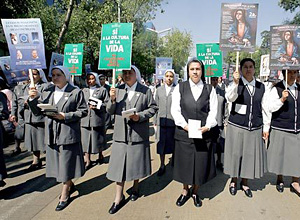 |
 |
 |
 News Around the Republic of Mexico | April 2007 News Around the Republic of Mexico | April 2007  
Abortion Rights Gain Ground in Heavily Catholic Mexico
 Sara Miller Llana - Christian Science Monitor Sara Miller Llana - Christian Science Monitor


| A group of Catholic nuns in Mexico City protest in Sunday's "March for Life" called by Catholic organizations opposed to a bill that would decriminalize abortion in the nation's capital. (Alfredo Estrella/AFP)

Changing times

The country has seen the liberalization of a spate of controversial social issues in recent weeks:

Mexico City began offering same-sex unions in March. The northern state of Coahuila pioneered it in January.

The Senate began discussing the legalization of euthanasia on April 12.

The Supreme Court ruled in February that soldiers who are HIV-positive cannot be expelled from the military.

The Christian Science Monitor |
Patzcuaro, Mexico — Mexican bishops have threatened legislators, doctors and women with excommunication. But Tuesday, the Mexico City assembly is expected to pass a new law legalizing abortions.

If it does, it would put the capital of the world's second-largest Catholic nation in the same league with Cuba and Guyana — the only countries in conservative Latin America that allow abortions in the first trimester, as the U.S. does.

A similar bill has been introduced in Mexico's national legislature.

If the relaxed abortion laws pass, they would mirror moves by Colombia, El Salvador and Chile toward partial legalization.

Only in increasingly evangelical Christian Nicaragua has the abortion law become stricter.

Yet where some activists see a new panorama for women's rights, Jorge Serrano Limon, the head of the anti-abortion group Provida, sees the potential for a country he hardly recognizes.

"Today it's abortion; tomorrow it's euthanasia," he says. "It will be a chain that denigrates Mexican society."

Changing times

The country has seen the liberalization of a spate of controversial social issues in recent weeks:

Mexico City began offering same-sex unions in March. The northern state of Coahuila pioneered it in January.

The Senate began discussing the legalization of euthanasia on April 12.

The Supreme Court ruled in February that soldiers who are HIV-positive cannot be expelled from the military.

The abortion debate has underscored the weakening influence of the Roman Catholic Church as well as the rural-urban divide in the country.

In the villages surrounding Lake Patzcuaro in the agricultural state of Michoacán, life has hardly changed over the decades — even as Mexico City, five hours south, has become one of the world's largest megalopolises.

But the vote to legalize abortion in the capital for any reason has sent ripples among these communities in the home state of Mexico's conservative president, Felipe Calderón.

"This is so difficult; it's a life," says Gabriela Rendon, as her two young boys gallop across her toy store in the town of Quiroga. "Things in the city are changing too much, and they change the whole culture of the country."

Mexico already allows abortion in the first trimester if the woman's life is in danger or in cases of rape and incest.

The new bill was proposed by the leftist Democratic Revolution Party — the party of defeated presidential candidate Andrés Manuel López Obrador — in the Mexico City assembly.

Although the state of Yucatán is the most expansive — allowing women with three children to get abortions if they can prove they don't have the means to support another child — Mexico City's would be the most liberal.

A survey in Mexico in January showed the country split evenly when asked if women should be able to decide freely whether they want an abortion in the first three months.

But when responses were separated between rural and urban areas, the numbers shifted: Of those in urban areas, 53 percent supported the idea, while 62 percent in rural areas reported being against it.

Luis Mota, the gatekeeper of ancient Purépecha ruins in Ihuatzio near Patzcuaro, says the debate has divided his town, too: And, he says, women will get abortions no matter what. Yet legalizing it could have a broader impact on society.

"You have to weigh the causes," he says. "This law could repeat itself across the country."

Miles down the lake in Tocuaro, Ana Laura Orta, an 18-year-old whose family has long partaken in the ancient mask-making craft famous there, says the decision gives society — especially youths — more reason to do what they please. She says teens from her town could easily go to Mexico City to get an abortion.

"Now we look more to Guanajuato [a state that has seen protests against the abortion measure] than Mexico City," she says.

Instead of pushing the rural areas farther away from the cities, says Marma Consuelo Mejma, the director of Mexico's Catholics for the Right to Decide, it could equalize the two as more rural women, with the lowest education levels and access to medical care, are given an alternative.

"It's an issue of social justice," she says.

Marcelino Hernandez, the auxiliary bishop of the Archdiocese of Mexico, has warned legislators that if they vote for the proposed bill, they would be excommunicated upon the first procedure under law. The Roman Catholic Church is also pushing for a national referendum on the issue.

But Roberto Blancarte, a sociologist of religion at the College of Mexico, says the church will not influence public opinion as it might have in the past.

Democracy has played a larger role, though, says Blancarte. After 71 years of authoritarian, one-party rule, Mexico has, since 2000, been undergoing deep changes at all levels. | 
 | |
 |



